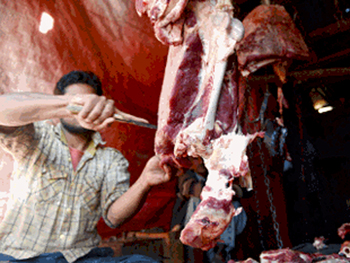Mumbai, Sep 14: The Bombay High Court today stayed the controversial ban on sale of meat in Mumbai on September 17, but refused to interfere with the bar on animal slaughter on that day.
 The High Court, which was hearing a petition filed by Bombay Mutton Dealers Association challenging the ban imposed in the wake of Jain community's 'Paryushan' fasting period, said the stay will be limited to Mumbai jurisdiction area.
The High Court, which was hearing a petition filed by Bombay Mutton Dealers Association challenging the ban imposed in the wake of Jain community's 'Paryushan' fasting period, said the stay will be limited to Mumbai jurisdiction area.
Though a similar ban has been imposed in Mira-Bhayander and Navi Mumbai municipal corporations in Mumbai's adjoining Thane district, the court said it was not concerned about it "as nobody has come forward challenging the ban there."
A division bench of Justices Anoop V Mohta and Amjad Sayyed in their order said, "We are staying the ban on sale of meat on September 17, but we are not interfering with the ban on slaughter of meat and closure of abattoirs on that date."
The High Court also observed that though the Maharashtra government issued a circular in 2004 banning meat sale on two days, it was never implemented fully.
"Though there was a ban since 2004, it was never implemented in its true sense," the judges said.
The court said there has been inconsistency in the stands of Municipal Corporation of Greater Mumbai (MCGM) and the state government.
The state government had on September 7, 2004, issued a circular stating that for two days during the Jain community's 'Paryushan' fasting period there will be closure of abattoirs and ban on slaughter and sale of meat.
"Although the circular was of 2004, we are very clear that the MCGM never fully implemented the ban on sale of meat. It never insisted on this (ban on sale of meat), but only insisted on closure of abattoirs," the court said.
"We are only going by the law and not dealing with this matter via sentiments and political things," the judges further observed.
The High Court also clarified that since the petition has challenged the ban only in Mumbai area, the stay too will be limited to the Mumbai jurisdiction area.
The court said, "We are not concerned about what is happening in Mira-Bhayander or Navi Mumbai as nobody has come forward challenging the ban there."
The HC also queried as to why fish and eggs were excluded from the ban. "If it is a question of practice of non-violence by the Jain community, then why only mutton and chicken have been included in the ban and not fish and eggs?" the court asked.
The High Court has posted the petition for final hearing after four weeks. The petitioners have claimed that the decision is unconstitutional as it affects the livelihood of a section of people and favours a small percentage of population. It also goes against the secular fabric of the Constitution, they have said.
The MCGM had on September 11 told the Bombay High Court that it has decided to withdraw its decision of meat ban on September 13 and 18. However, a separate two-day ban imposed by the state government will remains in force on September 10 and 17.





Comments
Add new comment